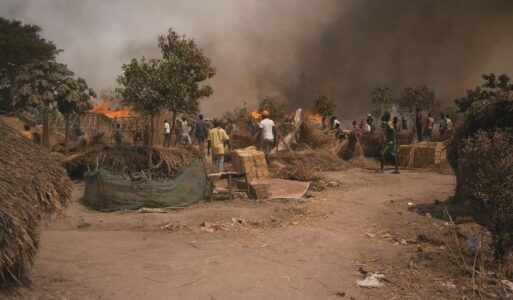
Sub-Saharan Africa now at the centre of Islamist extremist threats to Christians
SUB-SAHARAN Africa is now the epicentre of violence against Christians, as Islamist extremism spreads across the region, the latest World Watch List reports.
The rapid spread of violence across the region was the most disturbing trend picked up by the study, said the charity Open Doors, which produces the list each year, in which it ranks countries according to the amount of persecution and discrimination faced by Christians.
In its 30 years of producing the annual report, it said, Christian persecution has “grown alarmingly, with persecution scores for nations almost doubling”.
Violence in sub-Saharan African has spread from Nigeria, which is ranked the seventh worst country for Christians, to Burkina Faso, Mali, Cameroon, Niger, Mozambique, and the Democratic Republic of the Congo.
Somalia, which is in the Horn of Africa, where the al-Shabab group has said that it wants to eradicate Christians from the country, is ranked at number two in the list. Open Doors estimates there are just a few hundred Christians left in the country. In all, 26 countries in Africa report high levels of Jihadist violence.
One in five Christians in Africa are subject to high levels of persecution, the report said. Around the world, one in seven Christians suffers persecution.
Violence in sub-Saharan Africa is perpetrated by militants from Boko Haram, Islamic State West Africa, and Fulani tribesmen, who target Christian communities for kidnap, rape, and murder.
Open Doors said that the violence has been made even worse by an influx of the Kremlin-backed Wagner group, which originated in Chechnya and is also fighting in Ukraine.
Frans Veerman, who compiled the list, said the whole area was heading towards “a vast humanitarian catastrophe” and international governments were ignoring the scale of the problem.
In Nigeria, attacks on Christians have rapidly expanded from the north to southern areas, which are predominantly Christian.
Last year, 4650 Christians were killed in Nigeria — more than 1000 more than in 2021; 470 churches were attacked or closed, and more than 2500 people were abducted.
North Korea has returned to the number one slot in the List, after a new wave of violence under its new “anti-reactionary thought law”. The law criminalises any published materials of foreign origin, including the Bible.
Most of the countries in the top ten have only shuffled positions, with Afghanistan moving down from number one last year to number nine. Both the Yemen and Eritrea moved up the list, to number three and four respectively.
Sudan has re-entered the top ten, after dropping out following steps taken towards religious freedom, including the end of apostasy laws. The military coup in 2021, however, has led to an increase in authoritarianism and increased persecution for Christians.
The sharpest increase in persecution levels has been in Latin American countries, with Mexico, Cuba, Colombia, and Nicaragua moving up the list.
In Nicaragua especially, which entered the top 50 of the list for the first time, the silencing of Christians has become increasingly apparent, with churches that speak out against injustice and human-rights violations by the government viewed as troublemakers, the report said.
At the launch of this year’s report in Westminster, the chief executive of Open Doors, Henrietta Blyth, said: “Since 1993, both the intensity and spread of persecution of Christians worldwide has dramatically increased. In the past 30 years, the number of countries in which Christians face high to extreme levels of persecution has nearly doubled, from 40 countries to 76.
“There is no question that life is becoming more difficult for Christians in many countries, and yet, against all the odds, faith continues to grow when people are forced to choose between Jesus and the death of all they hold dear. Sustained pressure is refining the Church.”
Timothy Cho, from North Korea, spoke about life for Christians in North Korea: “The [North Korean] regime aims to wipe out every Christian in the country.
“Christianity itself is seen as a national security risk, and every new piece of legislation targets Christians as the first to be eliminated.”
He urged MPs to act: “Seventy-five years of totalitarian rule [in North Korea] hasn’t succeeded in destroying hope, faith, or love.”
Source: churchtimes





